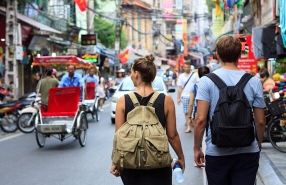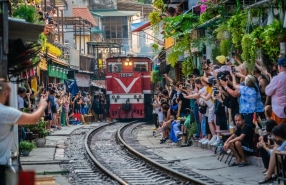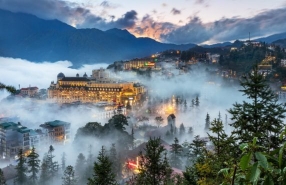Sapa Or Pu Luong Nature Reserve? Which Is Better For Your Vietnam Trip

Sapa and Pu Luong are increasingly attracting worldwide travelers, drawn by their lush nature and the cultural beauty of ethnic minorities. However, it is not always possible to explore both destinations in a single trip. If you're passionate about discovering the daily life of the ethnic groups, Sapa will be the perfect choice. On the other hand, if you prefer outdoor activities like trekking through villages and swimming under waterfalls, the Pu Luong Nature Reserve will captivate you. This blog will help you make the right choice for a trip to Vietnam!
Table of Contents
I. Overview of Sapa and Pu Luong Nature Reserve
Sapa Misty Town or Pu Luong Nature Reserve: Which destination should you choose? First, let's take a brief look at these two destinations.
Sapa, located in Lao Cai province, is about 320 km north of Hanoi, roughly a 6-hour drive. This town has long won the hearts of travelers with its cool climate year-round, breathtaking landscapes, iconic sites, and the warm hospitality of its locals. Perfect for a family trip or a relaxing stay for seniors, Sapa is a safe bet for those seeking comfort and cultural discoveries.
The Pu Luong Nature Reserve is located in Thanh Hoa province, about 160 km west of Hanoi, just 4 hours by car. This is a great option for visitors with a tight schedule! This little paradise offers a complete immersion in nature: lush forests, mountains, rivers, waterfalls, caves, and charming ethnic villages nestled between vast terraced rice fields. In Pu Luong, you can enjoy outdoor activities such as hiking, cycling through the villages, swimming underwater, relaxing in bungalows, and interacting with the locals.
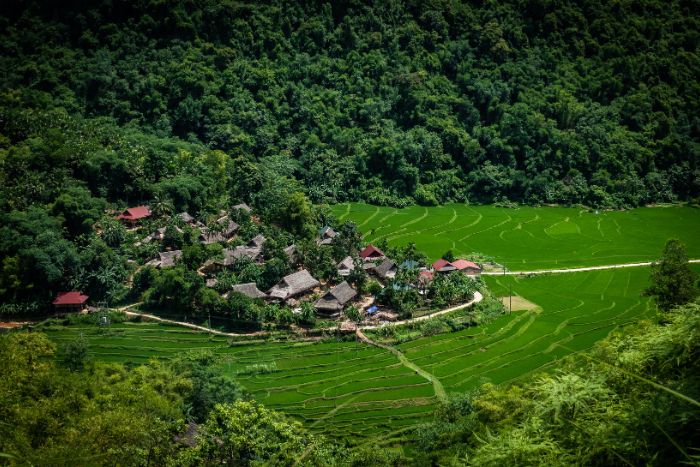
II. Why visit Sapa, the misty town?
1. Meet the ethnic people of Northern Vietnam
Sapa is home to many ethnic groups in northern Vietnam. It’s common to see locals dressed in traditional costumes, a way for them to share their culture with visitors. You can visit ethnic villages like Cat Cat, Ta Van, and Ta Phin, where you can meet groups such as the Hmong, Dao, Giay, and Nung. These villages provide a true snapshot of daily life among the ethnic minorities: their history, traditional customs, ancestral crafts, and much more. From these villages, you’ll also enjoy breathtaking views of the vast rice terraces that stretch along the mountainsides, offering a picturesque landscape to Sapa.
2. Discover the colorful ethnic markets
The Sapa ethnic markets are cultural events held once a week, so not everyone will have the chance to visit them. These markets are excellent opportunities to dive into the customs and trading activities in Sapa. Ethnic groups from surrounding villages gather at the markets, buying and exchanging goods, and chatting until the market ends. You’ll also discover many handcrafted items made by local artisans, such as embroidered fabrics, colorful clothing, and silver-plated jewelry.
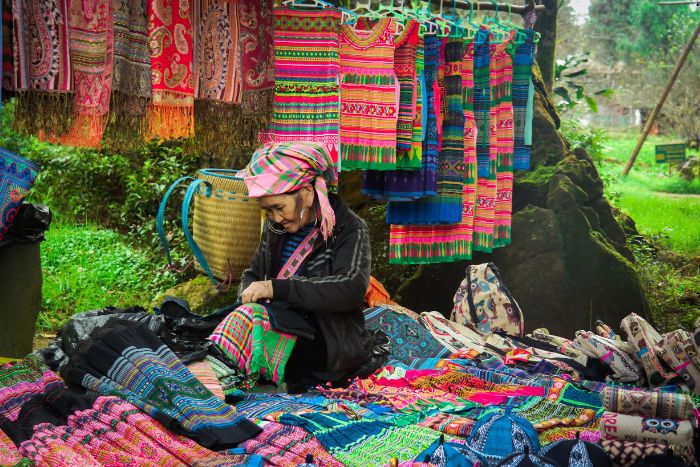
3. Taste Sapa local cuisine
In Sapa, visitors can enjoy the typical food of the Vietnam north-western region. The dishes, each marked by the identity of the different ethnic groups, are made from local ingredients. For example, Sapa salmon, caught in the cold mountain streams, has firm and lean flesh. Also, don’t miss out on tasting the Hmong "thắng cố", a traditional dish made with horse meat, or the Tay "phở chua", made with rice cultivated in Muong Khuong.
III. Why visit Pu Luong Nature Reserve?
1. Experience fun outdoor activities
Not far from Hanoi, Pu Luong, a hidden gem, is less known to travelers than Sapa Vietnam. Here, you can enjoy exciting outdoor activities, such as a refreshing swim at Hieu Waterfall, where crystal-clear water gently cascades over limestone formations. For hiking enthusiasts, climbing Mount Pu Luong is a must, offering breathtaking views of the stunning natural landscapes within the reserve.
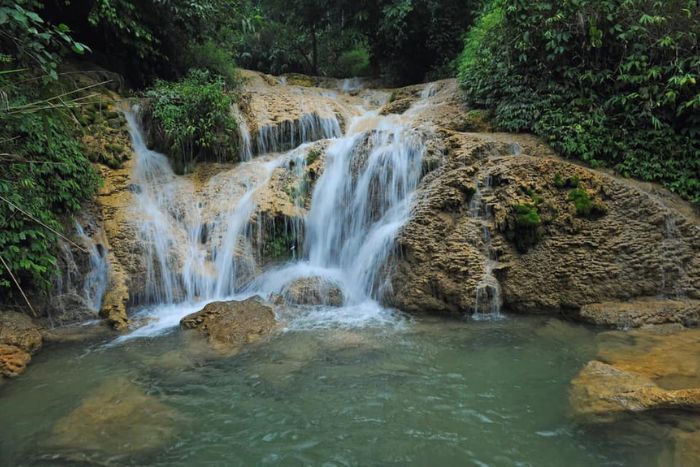
2. Immerse yourself in pristine nature
The Pu Luong Nature Reserve is surrounded by majestic mountains, where the terraced rice fields carved by Vietnamese farmers create a breathtaking landscape. Numerous homestays are nestled in the heart of these rice terraces, allowing visitors to wake up immersed in nature. You can explore the villages of the Thai ethnic group by bike, discover traditional textile crafts, and enjoy a delicious dinner with locals.
IV. Travel tips for Sapa and Pu Luong
1. When to visit Sapa and Pu Luong?
Sapa is a great destination year-round thanks to its cool climate. However, the best times to visit are from September to November, during the rice harvest season when the rice terraces turn golden, and in spring, from February to May, when the cherry and plum trees are in full bloom, painting Sapa in vibrant colors.
For Pu Luong, the ideal period is from May to October. Particularly, May and June offer lush green landscapes with rice fields and abundant nature.
2. How to get to Sapa and Pu Luong?
To reach Sapa or Pu Luong, you need to travel from the northern provinces of Vietnam. From Hanoi, you can get to Sapa by sleeper bus or limousine in 5 to 6 hours. With many schedules available, you can even choose to travel overnight to arrive in Sapa in the early morning.
For the Pu Luong Nature Reserve, the journey from Hanoi is shorter, about 4 hours with various schedule options. For a more comfortable and personalized experience, renting a car with a private driver is an excellent choice. Your driver will follow your travel itinerary, saving you time while ensuring professional driving.
Feel free to contact Autour Asia, your Vietnam travel company, for quick and efficient service.
3. How many days are ideal for Sapa and Pu Luong?
To fully enjoy the must-see sites of Sapa, it's recommended to plan at least 4 days. However, for a more complete and leisurely experience, a stay of 5 to 6 days is ideal. Here’s a suggested Sapa highlights 4 days:
- Day 1: Hanoi – Sapa
- Day 2: Sapa – Ma Tra Village
- Day 3: Cat Cat Village – Y Linh Ho Village – Lao Chai Village – Ta Van Village
- Day 4: Ta Van Village – Sapa – Hanoi
For Pu Luong, a 2-day and 1-night trip is possible, but you may miss some tourist spots. With more than 3 days, you’ll have the chance to explore the wild and preserved beauty of the Pu Luong Nature Reserve. Here’s a suggested 2-day itinerary for Pu Luong trekking:
- Day 1: Hanoi – Pu Luong – Cham River – Bamboo Rafting Experience
- Day 2: Kho Muong Cave – Hanoi
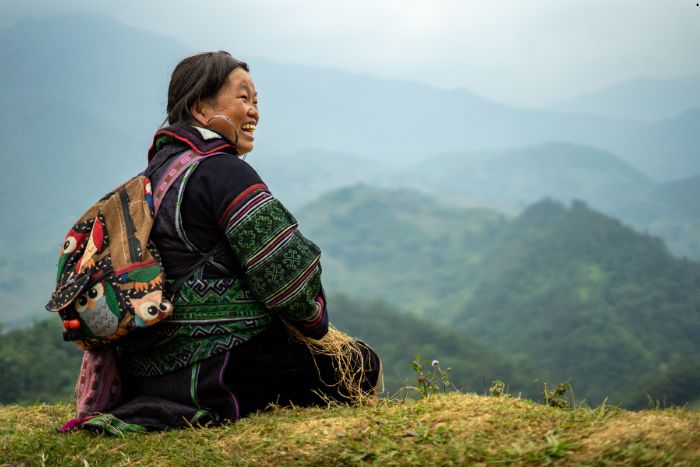
In conclusion, Sapa and Pu Luong are must-visit in northern Vietnam, offering breathtaking natural landscapes. Sapa, famous on Vietnam’s tourist map, charms with its cultural richness and ethnic traditions. Pu Luong, on the other hand, invites you to tranquility with its wild and less-visited panoramas. Whether you choose Sapa or Pu Luong, these two destinations promise unforgettable experiences during your Vietnam trip.
For cultural experiences, Sapa tends to offer more interactions due to its vibrant ethnic diversity, including Hmong, Dao, Nung and Tay communities. Visitors can explore traditional markets, participate in local crafts, and learn about unique customs in many ethnic villages.
Pu Luong, however, provides a quieter, less-touristy experience with Thai ethnic communities. Here, you can engage in daily life activities and enjoy a more intimate, slow-paced cultural immersion. Both offer rich insights, depending on your travel style.
Popular Sapa accommodation options range from cozy homestays with local families to luxurious mountain-view resorts. For an authentic experience, try a homestay in Ta Van or Cat Cat Village, where you can immerse yourself in local culture.
If comfort is key, consider staying in Sapa luxury hotels such as Hotel De La Coupole - M Gallery Sapa, Silk Path Grand Sapa Resort & Spa, Sapa Jade Hill Resort & Spa,...
Related travel guide
Other similar articles
CUSTOMIZABLE BY LOCAL EXPERTS
Personalized trip at the original price!
REFUND GUARANTEE
We believe in our work and promise to give you money back.
GOOD PRICE / QUALITY
95% satisfied more than expected!
24/7 LOCAL SUPPORT
We are always available online to provide assistance at any time.
Most read articles
Autour Asia is highly recommended on
Embracing the mission of "Satisfied more than expected" and providing authentic experiences, we have received numerous recommendations on reputable travel forums:













